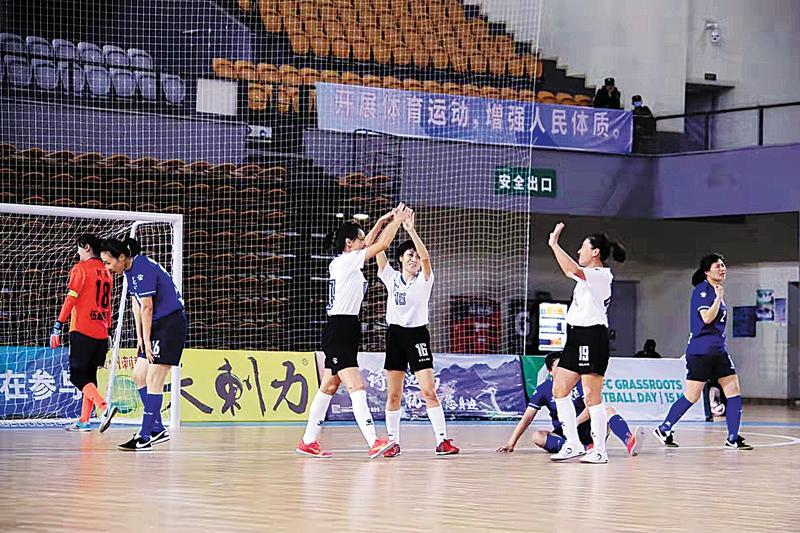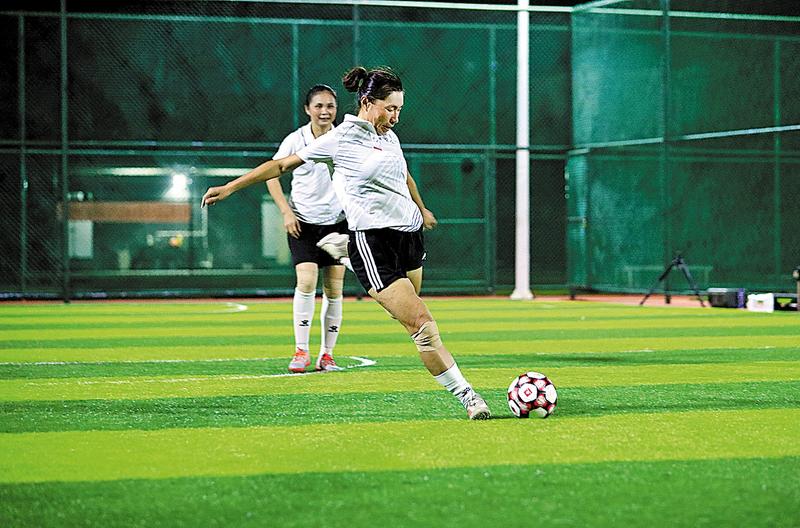After winning the gold medal at last year's National Games, the players are determined to enjoy the sport. Zhang Yi reports.
 The female soccer team from Zhanjiang, Guangdong province, won the gold medal at the National Games last year. (PHOTO PROVIDED TO CHINA DAILY)
The female soccer team from Zhanjiang, Guangdong province, won the gold medal at the National Games last year. (PHOTO PROVIDED TO CHINA DAILY)
One evening last month, a women's soccer team in red jerseys and stockings played under lights against a male team in Zhanjiang, Guangdong province.
They easily held the spectators' attention, because the team is the only one in the city's amateur soccer league that is composed almost entirely of women-the exception being the male goalkeeper. With no other female teams, they always play against men, and they usually win.
Last year, the team represented Guangdong in the women's five-aside futsal veterans' event at the 14th National Games, which take place every four years, and won the title.
It was the first time a team from the province had won the gold medal at the event.
They are nicknamed the Moms' Soccer Team because the members are all mothers and have an average age of 41. They played soccer together in their younger years, but now most have unrelated careers, such as security guard, sales, office work, PE teacher and housewife.
After getting married and having children, they were too busy to play sports, so soccer gradually faded from their lives. However, a few years ago, they reunited.
"It brings us joy and respect from others," said Tang Jingyi, the oldest player who also runs the team's affairs. A slight figure with close-cropped hair, the 47-year-old mother of two ran around the field, looking like a teenager from a distance.
The women learned to play soccer in the 1980s, when the sport began including women at the grassroots.
Every year, a coach from a sports school in Zhanjiang selected primary school students in Chikan district for an amateur female soccer team. They received training and later represented the district or the city in various competitions.
In the late 80s, Tang was chosen for the team because she could run fast. The talented player became the captain, leading her side to a provincial championship.
She started out wearing the No 16 shirt, and although she was the team's most effective performer, she decided to stick with it, even though tradition dictated that the best player should wear No 10.
However, when she was 18, Tang took off her soccer boots and put on high heels, having decided to quit the game when the coaches wanted to train her to become a professional player. "I suddenly hated soccer, because the intense physical training made me feel it was no longer fun. I also feared sunburn," she said, referring to her fair skin.
Having enjoyed dressing up since childhood, Tang became a beautician and opened a beauty salon, which boasted eight beds at its peak. Her husband works in real estate and they have a very comfortable lifestyle.
"I never told my customers that I played soccer in the past, and they wouldn't have believed it, either. I had waist-length hair and wore ladylike clothes, which was not at all athletic," she said.
 Zhu Yanying, the team's goalkeeper, takes the ball. (PHOTO PROVIDED TO CHINA DAILY)
Zhu Yanying, the team's goalkeeper, takes the ball. (PHOTO PROVIDED TO CHINA DAILY)
Surprise reunion
Xie Wenzhen also declined the opportunity to pursue a career in the sport. Instead, she studied computers at a vocational school after playing soccer for many years because she thought the subject would help her find a job.
Later, she worked for a clothing company as a saleswoman, clerk and cashier.
The idea of returning to the field came in 2015 when she was diagnosed with hives. She had been having treatment for a while, but the pills made her feel groggy and they had no obvious beneficial effect.
"The hives itched and I couldn't sleep sometimes. A red rash appeared after scratching, just like a caterpillar crawling across and leaving a trail on my skin," the 38-year-old mother of two said.
Xie attributed her illness to stress and lack of exercise. She married a tour guide in 2009, and quit her job after having a second daughter in 2013. In the event, the marriage didn't work out, so she got divorced a year later.
"I was so tired," she said, recalling her busy morning schedule as a single mom: She got up at 5 am to buy and cook breakfast, then took her older daughter to school at 7 am before returning home to care for her baby girl.
 Team members pose for a photo after winning the gold medal. (PHOTO PROVIDED TO CHINA DAILY)
Team members pose for a photo after winning the gold medal. (PHOTO PROVIDED TO CHINA DAILY)
She thought playing soccer might boost her immune system, so she contacted her teammates from her teenage years and was surprised to find that more than 10 were willing to meet up. They hadn't seen each other for years, but soccer reunited them.
On the first day they met again, the women, who had barely played soccer after becoming mothers, chatted a lot, asking each other how many children they had.
"Some hadn't changed much, while others had put on weight and wanted to sweat (to lose the extra kilos)," Xie said. During their first practice game, the players were exhausted and had to rest every five minutes.
"I felt like I couldn't breathe. My lips were dry and blanched, but I hadn't run with such joy for a long time. We laughed and teased each other about missing the ball at our feet," Xie said.
Since then, the team's members have played soccer twice a week. Gradually their popularity has risen and their physical stamina has improved.
 Xie Wenzhen kicks the ball during a game. (PHOTO PROVIDED TO CHINA DAILY)
Xie Wenzhen kicks the ball during a game. (PHOTO PROVIDED TO CHINA DAILY)
Veteran champions
In March last year, the women were invited to represent Guangdong in the futsal competition at the National Games. They were in the veterans' competition, which was for players ages 37 to 60.
In April, with less than two months to go, they had a problem-they hadn't found a proper goalkeeper.
The ideal candidate, Zhu Yanying, rejected their invitations because her sons were so young, with one age 4 months and the other age 3.
Tall and with quick reactions, Zhu was a well-known goalkeeper in Zhanjiang. When she finished middle school in 1998, she accepted an offer to leave her hometown and move to Wuhan, Hubei province, with several teammates and join the team there as the province had just begun to develop the sport.
She attended high school and university in Wuhan, getting free tuition plus living expenses because of her soccer expertise. Her team ranked in the top eight in the 10th National Games in 2005, a record for the province at the time. In one critical match, Zhu saved two kicks in a high-pressure penalty shootout.
She retired after the game, at the peak of her career. "I used to travel around for matches. I didn't want to live a wandering life. I was homesick and missed my parents," she said.
The 40-year-old is now a PE teacher at a college in Zhanjiang. She married in 2017, and had her first son in 2018 and a second in 2020.
"Teaching is an ideal job and I enjoy the stable life," she said, adding that when the team repeatedly asked her to join, she faced a dilemma.
"After all, soccer is a part of my life. Deep inside I wanted to join in, but reality hindered me as I was nursing a baby and my body was unused to the fierce competition."
Her husband's understanding attitude made her finally decide to go.
She said that from April, the start of a period of intensive training, until the competition in June, she experienced the darkest moments of her life, but achieved a breakthrough.
She nursed her baby between training sessions. She was exhausted from training, but still had to deal with the child, who cried incessantly as a result of premature weaning.
"Only a mother can understand the physical pain and mental pressure," Zhu said. Despite all the obstacles, she was determined to get the best results possible.
After winning the championship, she chose to return to her routine life.
She seldom plays soccer now because family matters dominate her days. She also has problems with her lower back, caused by frequently reaching down to the ground to scoop up the ball in front of the goal.
"It was a meaningful journey. I broke my own record. I was amazed that a mother in my age group could still get on the field, and that my skills were still suited to the game," she said.
Now, many of the team's members try to find the time to play when family matters allow. They play the sport for fun and take care to avoid injury.
"We usually play for two hours each time. After, we rarely have dinner together, though, as we have to hurry home to take care of our kids," said Xie, whose skin problems have eased.
"On the field, I completely ignore all of life's troubles."
Contact the writer at zhangyi1@chinadaily.com.cn


